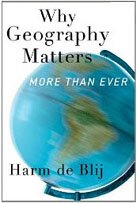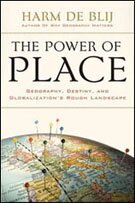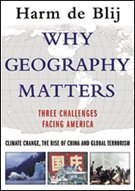 Home Appearance Schedule Resume´ / Vitae Books Public Speaking Opinion Notes from the Field TV Credits Video Clips For Press & Media Contact Information Blog: The Geography Factor |
Current Books by H. J. de Blij
Why Geography Matters: More Than Ever354 pages (August 2012)In recent years our world has seen transformations of all kinds: intense climate change accompanied by significant weather extremes; deadly tsunamis caused by submarine earthquakes; unprecedented terrorist attacks; costly wars in Iraq and Afghanistan; a terrible and overlooked conflict in Equatorial Africa costing millions of lives; an economic crisis threatening the stability of the international system. Is there some way we can get our minds around these disparate global upheavals, to grasp these events and their interconnections, and place our turbulent world in a more understandable light? Acclaimed author Harm de Blij answers this question with one word: geography. In this revised edition of the immensely popular and influential Why Geography Matters, de Blij tackles topics from the burgeoning presence of China to the troubling disarray of the European Union, from the dangerous nuclear ambitions of North Korea to the revolutionary Arab Spring. By improving our understanding of the world's geography, de Blij shows, we can better respond to the events around us, and better prepare ourselves to face the global challenges ahead. Peppering his writing with anecdotes from his own professional travels, de Blij expands upon his original argument, offering an updated work that is as engaging as it is eye-opening. Casual students of geography and professional policy-makers alike will benefit from this stimulating and crucial perspective on geography and the way it shapes our world's events. America, de Blij warns, has become the world's most geographically illiterate society of consequence. Indeed, despite increasing global interconnectivity and rapid change, Americans seem to be less informed and less knowledgeable about the rest of the world than ever. In this compelling volume, de Blij shows why this dispiriting picture must change, and change now.
The Power of Place: Geography, Destiny, and Globalization's Rough LandscapeOrder Today! Hardcover Advance Praise: "This meticulous analysis of the impact of everything from religious fundamentalism to the streamlining of world languages on these three groups will serve as an indispensable primer for serious policy makers." -Publishers Weekly "What Carl Sagan did for cosmology, Harm de Blij is doing for geography. See, hear or read him and you will sign on for a continuing course in a subject that he has brought alive like no one else in our time. The Power of Place is one of those books I hope the next President will read between the election in November 2008 and the inaguration in January. There couldn't be a better way to learn that the world isn't so flat, either." -Bill Moyers, host of Bill Moyers Journal, PBS "The Power of Place is a tour-de-force, a fascinating and deeply knowledgeable account of the crucial ways in which 'place', the Earth's physical geography, shapes global society. The world, we learn, is not flat but is indeed a rugged terrain, in which climate, topography, natural hazards, pathogens and much more, shape economy, politics, language, culture, and power. The Power of Place is a treat for the specialist and a thrilling eye-opener for the general reader." -Jeffrey D. Sachs, Director of the Earth Institute at Columbia University
Why Geography Matters: Three Challenges Facing America304 pages; 41 maps & charts; 6-1/8 x 9-1/4; 0-19-518301-0 (July, 2005)Order Today! Hardcover | Paperback Advance Praise: "If the author did nothing more than evince the extent to which geography is political destiny, he would have accomplished a worthwhile objective. But he succeeds in much more, raising thought-provoking issues on global warming, terrorism, China’s ascendancy, Europe’s future, Russia’s role, and Africa’s prospects, issues our legislative and executive branches of government as well as members of the media need to consider in geographic perspective. Every person responsible for making public policy, as well as those who interpret these complex issues for the public, should read this book." -Anthony H. Ewing, former Director of the Committee on Research Coordination for the Science Advisor, Office of Science and Technology Policy, Executive Office of the President. Harm de Blij packs so much useful information and so many thoughtful insights into Why Geography Matters that the book is indispensable to those seeking to understand our complex, changing world. The United States State Department would be well served to make this book required reading for all newly recruited foreign service officers and diplomats—and it is strongly recommended for all citizens they represent. In his review of global challenges—climate change, the rise of China, the growth of terrorism and more, and he slights none of them—[de Blij] demonstrates persuasively how the tools and findings of geographers are indispensable in understanding the world today. In its scope, analytical balance, power, originality, and readability, Why Geography Matters is a matchless book; the riveting chapter on Africa is the best summation of the continent’s past and prospects I have ever read. —Willard DePree, Former United States Ambassador to Mocambique and Bangladesh, On Special Assignment to the Department of State Why Geography Matters is a provocative, fast-paced book that interprets the world through the dynamic discipline of geography… The remarkable chapter on Africa is at once compelling and tragic, but also cautiously hopeful. If you think that geography makes your eyes glaze over, try this book and you’ll discover insights you’ve never encountered before. —David Miller, Senior Editor, National Geographic Maps
Wartime EncounterPaperback - $12.95To order online: Hudson River Publishing This book presents a child's eye view of life in occupied Holland during World War II. While the author waited for the Allies to liberate his country he immersed himself in geography lessons, which gave him a window on the world. "This is a fast-paced yet sensitive story of a boy robbed of his youth in the Nazi-occupied Netherlands. Surrounded by books, music and maps -- particularly one chronicling the Allied invasion of Europe -- Harm converted enforced solitude into the start of what was to become a brilliant career that led to international prominence and to a long affiliation with the National geographic Society as narrator, editor, and member of its Committee for Research and Exploration." -Gilbert Grosvenor, Chairman, National Geographic Society "The moving story of a stolen childhood and of the power of the written word. Seeing the world through geographers' eyes during wartime isolationand deprivation, a young boy started a lifetime love affair with geography that blossomed beyond his dreams. This is the tense tale of those five world-war years. A riveting, intimate, remarkable book." -Arte Johnson "A wonderful story ... beautifully written. I started it after supper and simply could not put it down. The book tells of a time, place and circumstances that must never be forgotten." -Peter Gould Comments on Harm de Blij's Work:TV Guide: "Television's first geography correspondent...is a worldly authority who covers major news events by explaining how each one has been influenced by geography." People Magazine: "A big-league crowd pleaser who explains terra incognita for the legions who failed Cradle of Civilization 101 the first time around." Washingtonian Magazine: "Start a world crisis, and de Blij will take to the airwaves explaining its geographic background." Science: "Geography is the science of place. Its vision is grand, its view panoramic. It sweeps the surface of the Earth, charting the physical, organic, and cultural terrains...Harm de Blij has reminded us of the matching valence of erudition and beauty in science and its communication." Miami Magazine: "De Blij's former students are more than happy to talk about the influence he had on them. Students from the 1960's - now professors, deans, and department chairs - speak of his charisma, intellect, and spellbinding lectures as if they had just walked out of his classroom." |



